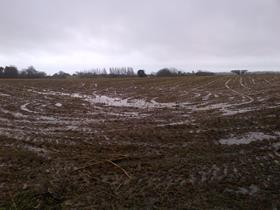
Dredging of the Somerset Levels will begin in March as soon adjacent land has dried sufficiently, the Environment Agency (EA) announced today.
The work will begin on eight kilometres of river channel where the Tone and Parrett meet at Burrowbridge.
It will initially take place on a 200-metre stretch of the river Parrett, identified by locals as a key stretch of river where significant amounts of silt have built up.
Go-ahead will be given as soon as the banks and adjacent land are dry enough for contractors’ excavators to work safely.
Paul Leinster, EA chief executive, said: “We plan to start dredging by the end of March, as long as the contractors deem it is safe to do so.
“We are committed to dredging as part of a broader package of work to protect people, property and land in Somerset.”
The EA has said previously that dredging may be part of the solution but will not solve the whole problem.
Last month, Lord Smith, chairman of the EA, told BBC Radio 4’s Today programme that draining Somerset's Tone and Parrett rivers would only make a 'small difference'.
He said: 'It is not the comprehensive answer that some people have been claiming.'
But floods minister Dan Rogerson said today marks a crucial step forward in protecting the Somerset Levels.
“We know those affected are tired and fed-up but I can assure them we are working around the clock to clear the flood water so they can get on with their lives.
“We are also looking to the long term, and I will be chairing the next meeting of the local senior leadership group soon,” he said.
The dredging issue has proved contentious in recent weeks with the NFU favouring it as a flood control method, while campaigners have said it could be counter-productive.
Salad grower and NFU member Stephen Watkins faced the Guardian’s environment journalist George Monbiot on BBC TV programme Newsnight on 31 January, to discuss the issue of flood damage to farmland.
Watkins, who has 250 acres underwater in Worcestershire near the River Severn, said dredging the rivers would prevent more flooding while Monbiot insisted it was “useless and counter-productive”.
Speaking on Newsnight, Watkins said: “I am a great believer in dredging the rivers. The reason for that is that more and more building has meant that flood water runs off the land more quickly.”
But Monbiot insisted that the answer lies in managing upland areas by removing sheep and planting more trees.
The EA and the government have come under increased pressure to take action to prevent further flood damage.
The plans for dredging will be formally advertised today in the Western Morning News and Somerset County Gazette as required by law before work of this type begins.



